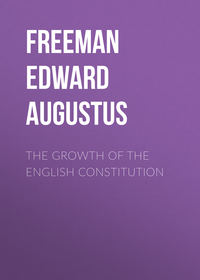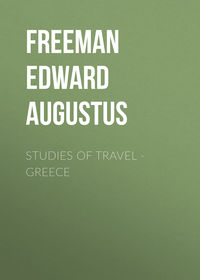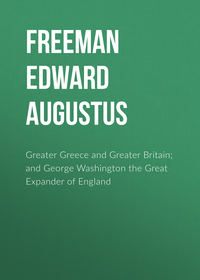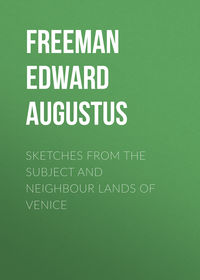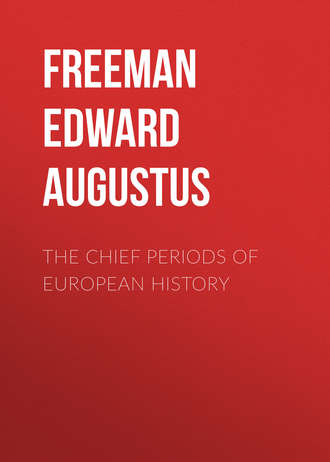 полная версия
полная версияThe Chief Periods of European History
But a fragment has escaped. Cities there still are of the old Burgundian realm, cities both of Romance and of Teutonic speech, from which the kingship of Cæsar has passed away, and which have not bowed the neck to any meaner lord. The Middle kingdom still has its representative in Europe; but that representative is no longer a kingdom but a free confederation. Massalia the twice free – Aquæ Sextiæ with her memories of Roman victory and Provençal countship – Arelate where kings took their crown in life and Vienna that sheltered them in death – Lugdunum whose name once spread to the Ocean and the British sea – all these have passed away; but Lausanne and Geneva still sit unchained beside their lake – modern freedom has not wiped out the memory of ancient kingship at Neufchâtel and Payerne – Basel, Basilia, in her very name brings up the thoughts of Empire, fit thoughts in a city where men so long defied the claims of Rome in her newer garb – and high above them all, younger and mightier, still stands the city by the Aar, the home of old patricians, the city looking forth upon her subject mountains, the Bern of Berchthold, yet nobler than the Bern of Theodoric, the city which, in days when the Middle kingdom might seem to have been forgotten, a poet of her own could greet in a twofold garb,
“Als Krone im Burgundenreich,Als freier Städte Krone.”There is thus still a free and abiding fragment of the old realm of that King Boso who, when men questioned his kingship, could tell them that he was “Dei gratia id quod sum.” But of a Burgundian nationality Europe now knows no trace. The fragment of free Burgundy that is left has joined with two other brands snatched from the burning, a fragment of Germany, a fragment of Italy, to form a political nation, none the less truly a political nation because it does not coincide with any nation defined by blood or speech. A fragment of the English folk, a fragment of the British, a fragment of the Irish, joined together to make for us that people of the Northern England which, among its other merits, has kept alive, under another name, the purest form of the English tongue. If we could not spare Scotland in our island world, our alter orbis, still less could we spare Switzerland in the wider world of the European mainland. A fragment of the German, the Burgundian, and the Italian folk, have come together to show us, in this age from which the power of Rome has vanished, one lively image of the age when the œcumenical power of Rome had not yet risen. Athens, like Rome, has sunk to be a seat of local kingship; Achaia still lives, if not on her own Mediterranean shore, yet in the lands which reproduce her political life. She lives in a figure in the mountain land, the home of all that is oldest and newest in Western tradition and Western thought. And she lives too in a figure in the vaster federal and vaster English land beyond the Ocean. We indeed feel the Unity of History to be a living thing when we see the work of Markos of Keryneia and Aratos of Sikyôn reproduced on two such widely different scales in the younger hemisphere and in the elder.
Thus in the Latin-speaking lands and on the central march of the Teutonic and Latin-speaking lands nations have grown up of themselves, they have failed to grow up, or they have been formed by an artificial union. But the city, as an independent political unit, has vanished. Even in Switzerland the city is subordinate to the artificial nation; and we can hardly say that any Swiss canton is now a city commonwealth in the older sense. The people of the surrounding district, once commonly a subject district, have everywhere won for themselves equal rights with the people of the town. If Baselstadt is a purely town-community, it is because Baselland has won for itself, not only equality but separation. In other lands the cities are simply members of the kingdom or commonwealth, though we have seen that, where cities once were great, nations have found it harder to grow into nations than elsewhere. In other parts of Europe, Celtic, Teutonic, Slavonic, nations have grown up without reference to cities at all. The Teutonic and the Slavonic political units are both something very unlike a city; the Celtic political unit is something yet more unlike. In none of these parts of Europe did the native political developement take the course which it took in Greece or Italy or even in Gaul, and the Roman influence was naturally immeasureably less than it was in Southern Europe. In all these lands the city is everywhere a direct importation from the South. It may be a real Roman colony; it maybe a Teutonic or Slavonic community shaping itself after the pattern of a Roman colony. Nowhere was the city a thing of purely native growth, nowhere was the independent city the ruling political idea around which all political life gathered. In one land indeed, in the central land, the land which took specially to itself the Teutonic name, cities did indeed become great and famous; but they became great and famous only under the conditions which I have just laid down. It was fitting that the German nation which sheltered its own Holy Roman Empire should conform to Roman traditions more nearly than England, Scandinavia, or the Slavonic lands. Cities therefore became an important element in the German kingdom. The oldest Germans looked on a walled town as a prison; yet in after days cities and city-life found the German land no unkindly soil. The Roman cities by the Rhine lived on, and became models for cities of more purely Teutonic birth. The Colony of Agrippina had its capitol no less than the Tolosa of Quintus Cæpio, and it seemed only in the nature of things that patricians should gather round it. Saxon kings, Saxon dukes, made younger cities arise after their model in the heart of the German land or on the shore of the Northern Mediterranean. Nor must we forget that other cities at which we have glanced already – will any one grasp my meaning and all that it suggests if I speak of one of them as “Verona in montibus?” – were simply cities of the German realm, to which circumstances gave in the end a fuller freedom than their neighbours. Zürich herself, “nobile Torregium,” “die uralte, löbliche, eidgenössische Stadt,” reckons among her titles of honour that the judgement-seat of Cæsar was so often held within her walls. In course of time that special home of Imperial power passed away, together with her fellows, from all dealings with Cæsar and his Empire. Others clave to their old allegiance till a new Francia reaching to the Baltic and the Hadriatic supplanted the ancient realm which was at once Francia and Romania. Those free cities of the Empire which lingered on till our own century came, like the cities of the Alpine land, of divers forms of growth. Augsburg – Augusta Vindelicorum – proclaimed herself to all time as of Roman and Imperial birth; round Nürnberg none but Teutonic memories can gather. And by the Northern and the Eastern sea, by the banks of Weser, Elbe, and Trave, cities arose which were called to a still higher and a more abiding destiny. Merchants, missionaries, self-styled crusaders, joined their efforts to plant German cities on the conquered shores of the Wend and of the older folk beyond him, folk beside whom modern Europe and her nations feel as intruders on foreign soil. The League of the Saxon Hansa, a power for which, as a League, we can hardly find a geographical place on land, became mighty indeed and memorable upon the seas. London and Novgorod formed parts of one union of trade and enterprise; the merchant cities could give law to the kingdoms of the North and could place whom they would on thrones which in Cnut’s day had looked to Winchester and which were now taught to look to Lübeck. But here too, as in more southern lands, the greatness of cities was not abiding. The League drooped; its members fell away; three only lived through the last storm to claim a revived freedom in the first new birth of Germany seventy years back. Three-and-twenty years ago I saw those cities still sovereign and independent; in theory more sovereign and independent than they were in the days of their might. On the coins of Lübeck was still graven, if not the image, yet the superscription of Cæsar; the Hanseatic city seemed to have put forth no marks or shillings since the days of the first Francis from Lorraine. But Cæsar lived only in his superscription; Lübeck knew no lord on earth; she was bound by no ties save those which bound her to her two Hanseatic sisters and to the lax Confederation which still numbered a single inland city among its members. The next year after my visit the tale of free cities was shortened, the freedom of those that still lived on was shortened also. Frankfurt has sunk from the rank of a commonwealth to become a city of a local kingdom; Lübeck, Bremen, Hamburg, are still commonwealths, but commonwealths which are again members of an Empire. They are survivals, but survivals which modern Europe, Romeless Europe, the Europe of huge kingdoms and of countless armies – happy when kingdoms mean nations and when armies do not simply keep down unwilling subjects – cannot spare from the midst of her. The age of free cities is past; in some lands the mere high-handed robbery of the stranger has wiped them out, as where the fetters of the meanest of oppressors still clank over enslaved Ragusa. In other lands the loss of local freedom has perhaps been outweighed by admission into a wider national unity. In two lands again the commonwealths still abide, tempered only by the obligations of a federal tie. But a federal tie is one thing when it binds together a group of lands and cities none of which could now stand alone; it is another thing when the federation has an Imperial head, when three surviving cities are grouped with duchies and kingdoms which could at any moment overwhelm them, and when duchies and kingdoms are again grouped in fellowship with another kingdom greater than cities, duchies, and kingdoms joined in one. Yet to this day the free city, even if shorn of its old greatness, its old independence, is still an element in our modern Europe. Those three surviving cities of the great Hansa are precious fragments indeed, fragments in one sense of a world when the Roman power had put on its German garb, reminders in another sense of a world on which the Roman power had not yet risen. As we trust never to see the day when the bull of Uri and the bear of Bern shall cease to be badges of a freedom more than municipal, so we trust never to see the day when Imperial Germany shall cease, among the ensigns of its free confederate members, to reckon ensigns more worthy of honour than the banners of dukes and kings, the towers of Hamburg, the key of Bremen, and the eagle-shield of Lübeck.
I have done my desultory picture of our Romeless world, desultory and imperfect as must be every picture attempted in lectures such as these, the object of which is not the communication of minute knowledge on any point. I am still at the threshold of my work. Some solid work I think I have done in inner chambers with the small and faithful band who follow me, who sometimes guide me, through book after book of the historian of the Franks. But what I have as yet preached, so to speak, on the house-tops has been in its own nature general and desultory. I have not, strictly speaking, been teaching; I have been purposely talking in a way which might call up memories in some and might stir up to inquiry in others. But through the general we make our way to the particular. Next term I trust to make even these more public lectures of a more solid kind. I have run with a swift pace through a general view of the Methods of Historical Study, through a general view of the chief periods of European history. This last series fills up for this year the tale of forty-two lectures which the iron rule of our masters demands from me. With such necessity laid upon me, I should think it savoured of arrogancy and impiety if I ventured on such a voluntary work of supererogation as a forty-third lecture. What the Commissioners deem enough you doubtless deem enough; so to-day I bring my desultory story to an end. In October I hope to begin a more regular course, and to make a path, through a true understanding of the early history of Gaul, to a true understanding of the early history of Britain. And I have one word more to say. Since I came here I have learned several things, I have learned one in particular. I have hitherto always shrunk from crying my own wares, from advertising my own writings. Whenever I have quoted myself or referred to myself, it has been with a feeling of doing something that one should be ashamed of. But I have learned in this place where I now stand, from a colleague who is now no longer a colleague, how very silly such modesty is, and how much better it is to quote oneself and talk of oneself as freely as one quotes and talks about anybody else. I will tell you then that a few years back I gave two courses of lectures on the other side of the Ocean which, I venture to think, contain matter worth reading. I think they contain matter specially worth reading by those who think of following my roundabout course in company, first with the Vandal who crosses the Rhine and afterwards with the Saxon who crosses the sea. They were printed in America; some copies have, I know, found their way into Britain. I must put a bold face on the matter, and say that those who have followed me thus far and who purpose to follow me again in October might spend their Long Vacation worse than in giving some part of it to reading my two courses of Lectures to American audiences, bound up in one not very big volume. You will find in them some things that I have said elsewhere, and, though some seem to think that impossible, some things that I have not said elsewhere. And so I bid you farewell for a few months, finding fault with you in nothing, except that, like most other Professors, I wish there were more of you. But one therefore feels all the more kindly to the elect, the faithful, the little band that watched with Ælfred, the stout hearts that lapped with Gideon, even though they be far from reaching the full tale of three hundred. And so I will end the work of my first academic year, with a wish to see you all and more also on the same benches in October; I part from you with the blessing of the modern Greek, εἰς καλὴν ἀντάμωσιν.
GREEK CITIES UNDER ROMAN RULE
I have in various forms tried to point out the special importance which, in the history of the world, belongs to the period which saw the establishment of the dominion of the Roman People over the civilized world of its time, especially over the Hellenic and hellenized lands round the eastern Mediterranean. It is of the first importance for the right understanding of general history to take in the real character of the state of things which was brought about by this gradual establishment of the Roman dominion. It is curious to see how constantly that state of things is misunderstood, from looking at the matter with modern eyes. And it is the more curious when we come to think how very modern the eyes must be which are unable to see the matter correctly. For we have hardly to go out of our own century to find lively images of the state of things which Roman conquest brought about. Yet we are constantly tempted to fancy that the rule of the early Roman Emperors, perhaps that of the Roman Commonwealth before them, was a centralized administration, in which all authority issued from a central power. We are used to the great kingdoms and commonwealths of modern Europe, in which local bodies may enjoy a greater or less degree of local independence, but in which they hold that independence in inherent subordination to the central authority, by virtue of laws passed by the central legislature. The land is divided into counties, departments, provinces, administered according to such rules as the central legislature may think good to lay down. It is true that in our own country the shire is, both in idea and in part of the land in historical fact, older than the kingdom. But in a large part of England the shire is as truly a division of the kingdom as a French department, and where it is not so historically it has become so practically. An English shire, an English borough, has no rights or powers but such as it has derived, in some shape or another, from the central power of the land, by act of Parliament or by royal charter. That central power has the same rights and powers in every corner of the kingdom. I speak of course only of the United Kingdom; as soon as we get beyond its limits, as soon as we enter the Scandinavian kingdom and the Norman duchy which lie so near to it but which form no part of it, so soon we still find ourselves in a state of things which has much in common with the Roman dominion. And if all this is true of the United Kingdom, it is yet more true of states like France and Italy, whose geographical divisions and administrative system have been drawn up as something wholly new in quite modern times. Yet down at least to the end of the last century, in many parts of Germany, of Italy, of Switzerland, of all the lands to which the power of Venice reached, the endless varieties of alliance and subjection between different towns and lands presented the closest analogies to the relations of which I have now to speak. Survivals went on even to our own time. In 1865 a small district was still held in condominium by the two free cities of Lübeck and Hamburg. I passed through it with a feeling as if I had been carried back into some distant age. I presume that since 1866 things are different there.
It is of course perfectly true that, at a later age of the Roman dominion, when the Empire began to change into an acknowledged monarchy – though monarchy is not the proper word for a power which was often held by two or more colleagues – that Empire did come much nearer to the character of a modern centralized state. It was mapped out into administrative divisions, and those divisions were administered according to a general law. But the dominion of Rome, Commonwealth and Empire, had been in being for several ages before this change took place. The elder Roman rule was not the rule, despotic or constitutional, of a man over an united territory; it was the rule of a city over other cities and lands, cities and lands standing to the ruling city in every possible relation, from nominally equal alliance to a subjection hardly better than bondage. That so it should be was the natural result of the way in which the Roman dominion was formed. With the political ideas of the third and second centuries before Christ no other state of things was possible. The way in which the dominion of Rome was formed, the process by which the cities and lands of so large a part of the world passed under the supremacy of one ruling city, has much in common with the further process which the growth of that dominion made inevitable, the submission of Rome herself to the dominion of one or more of her own citizens. In both cases the change was gradual. People often talk of the change from the Republic to the Empire, very much as they talk of the English Reformation, as if it were a definite act which took place in some particular year. Yet all that was characteristic in the Imperial power arose out of its gradual growth, its growth through an union of magistracies and extraordinary commissions which virtually bestowed supreme authority on their holder. Above all, out of the original character of the Empire as an extraordinary commission granted by a vote of the Senate came the fact that the Empire remained for ages without any law of succession. A law prescribing a mode of election and a law prescribing a rule of hereditary succession both assume an ordinary office which must be filled by some one; the Empire was in its origin an extraordinary office which might not be filled at all. A vote, or several votes, of the Senate entrusted a single citizen – or more than one citizen – with powers which practically amounted to sovereignty, and which in the end grew into acknowledged sovereignty. But that growth was slow. For a long time after the Empire began, the republican constitution, the republican magistracies, the republican assemblies, still lived on untouched in their outward framework. They had simply lost all living energy through the growth of a power greater than all, a power which sometimes directed their course of action, sometimes itself acted in their stead. If we could conceive, as once or twice did happen for a short time, the controlling power removed, that is, if the extraordinary commissions which made up the Imperial power were not granted to any one, the old elements of the commonwealth were there, able again to act for themselves as of old. The Senate, after ages of utter nullity, actually did act again as an independent body when the Goth was at the gates of Rome and the Emperor was far away at Ravenna. For Rome once more to act without her master there was no need to create any new power, but simply to take the fetters off an old one. In the earlier ages of the Empire, when the old traditions were more lively, when the forms of the old constitution were still observed, such a change would doubtless have been far more easy. A modern kingdom cannot be changed into a republic without an active change in its constitution. The executive authority must be vested in some new power to be created and defined for the purpose. The Roman Empire might have been turned back into a republic by a purely negative change. All that was needed was not to appoint an Emperor. The various powers of the State which had left off acting or had come to act only as the Emperor bade them, would doubtless, from lack of practice, from change in all surrounding circumstances, have found it practically impossible to act as they had done in the days of the old commonwealth. But there would have been no formal hindrance to their so doing; there would have been no need to clothe Senate or magistrates with any powers beyond those which they still held, though in a dormant state.
The power of Rome over her allies and dependencies during the Commonwealth and the early Empire was very much of the same kind as the power of the Emperors over Rome herself. It was something which overshadowed a crowd of old powers and liberties, which brought them down to practical nullity, but which in no way formally abolished them. The republican institutions of Rome under the early Empire, the constitutions of the allied states, of the dependencies, even of the direct subjects of Rome, under both the early Empire and the Commonwealth, were much in the same state as a man or a beast that is fettered or bridled. His inherent physical powers of action are not lessened; only they cannot be exercised, or can be exercised only according to the will of a master. So it was with Rome herself under the Emperors; so it was yet more strikingly with the dependencies of Rome under Rome republican or imperial. As Rome herself submitted only gradually to the rule of her Emperors, so the dependencies of Rome submitted only gradually to the rule of Rome. There could hardly have been one Roman province in which, as in an English county or a French department, every inch of soil stood in the same relation to the central power. Within the geographical bounds of most provinces, above all within the bounds of the Greek and hellenized provinces, there were cities and districts standing to Rome in all those endless relations which were the natural result of the different times and the different circumstances under which their connexion with Rome began. Here was a free and equal ally of Rome, a city which Rome had been glad to receive as a free and equal ally at a time when her alliance was really valuable. Nothing had happened to give any excuse for dragging down the old ally to any inferior position. In theory she was still as free as ever, keeping every power of a sovereign state within and without. No Roman magistrate had any authority within her territory; if she sent offerings to Rome or to Rome’s master, if she supplied a contingent to a Roman army, all was the gift of pure friendship from one equal ally to another. A neighbouring town might be in the strictly provincial relation; over her soil the Roman people had become, not only sovereign, but landlord; she might keep her old municipal constitution, but it was purely by the grant or sufferance of the ruling city. Such a city yielded obedience to Rome, because Rome was an acknowledged mistress; if its free neighbour practically yielded obedience to Rome no less, it was simply because, in an alliance between the weak and the strong, the strong will always give law to the weak. And between these two extremes there were endless intermediate shades. Besides the absolutely independent ally, there were allies who also had treaties with Rome, but whose treaties were less favourable, treaties which bound both sides alike, but which formally placed one of the contracting parties in a higher and the other in a lower position. Again, there were towns of the province itself on which Rome had bestowed, not by treaty but by her own grant, higher rights than the rest of the province. One city was free, keeping its own law, exempt from the ordinary jurisdiction of the Roman governor, paying no tax or tribute to Rome, but holding all these privileges by grant from the Roman state. Another was equally free within its own walls, but bought its privileges by the payment of tribute to Rome. And as there were within every Greek-speaking province spots which remained spots of free Hellas abiding in their old freedom, so there might be other spots which were transplanted fragments of the soil of Latium or of Rome itself, keeping in the foreign land the rights of Latium or of Rome. That is, there might be within the bounds of the province Latin or Roman colonies, or towns to which, without being in their origin Latin or Roman colonies, Rome had thought good to grant, sometimes her own full citizenship, sometimes only the half-citizenship of Latium. Of these, the free and allied city, the Roman and the Latin colony, were geographically within the province, but they were not legally part of it. To the Roman and the Latin colony we have nothing exactly answering in modern Europe; but Andorra and San Marino are still lively illustrations of the position of a small state which has powerful neighbours. San Marino, a perfectly independent state, but which, as wholly surrounded by its great neighbour, is practically cut off from exercising any of the external powers of an independent state, is in exactly the position of a free and equal ally of Rome. Such an ally might keep perfect internal freedom, but it was in the nature of things cut off from any foreign policy. Andorra, a dependent and tributary state, though keeping full internal freedom, would, if it had only one protecting lord, also have its parallels among the dependent allies of Rome. But, in the complication of mediæval relations, Andorra has two protecting lords, two receivers of tribute. That was a state of things which could not be in the days of the Roman Peace.


